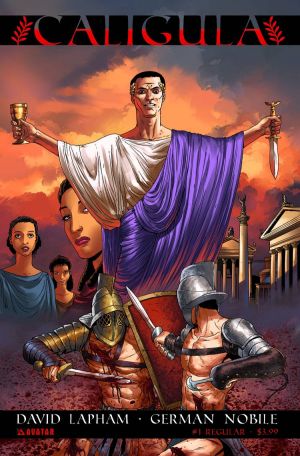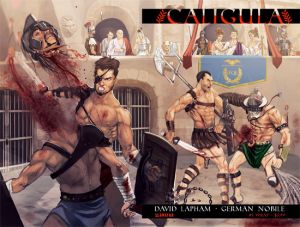Comics /
Spotlight /
Progressive Panels
Caligula #1
By Andy Frisk
March 30, 2011 - 13:18
Anyone who has studied the history of The Roman Empire up to the point of its slow decline and depravity is aware, at least superficially, of the story of the mad emperor Caligula. Fancying himself a god, Caligula immersed himself in every kind of vile perversity and insanity imaginable. Everything from incest to murder for pleasure were the pastimes of Caligula and his retinue. Granted, this deplorable depiction of Caligula comes to us from the halls of history as written by historians and playwrights like Seneca who didn’t like Caligula for various political reasons. Where there is smoke though, there usually is fire. Regardless of just how insane and depraved Caligula was in reality, his reign has been the perfect metaphor for the decline of Rome which was borne out of excess, complicity, arrogance, and the general insanity of its later rulers. Caligula has also been the perfect excuse for writers, filmmakers, and now sequential artists and writers to depict, in ever increasingly graphic terms, some really base and downright disgusting sexual deviancies and sadistic violence. Writer David Lapham and artist German Nobile are determined to take the story of Caligula to the next level though with Caligula from Avatar Press by adding a supernatural element to it.
 |
Caligula’s historically described depravity and evil seems almost supernatural in their own right, so do we really need a story that actively creates a fictional supernatural element to a story that is already supernatural in vileness? If done right, yes. Keeping the memory of history and its lessons alive is becoming a much more difficult task these days, especially amongst the incredibly short attention spanned Millennial generation. If it takes a comic book full of gore and supernatural elements that at least provides some inkling as to the lessons of history as pertains to any society that becomes too complacent and pleasure driven, then I guess Lapham and Nobile’s
Caligula is as good an entry into the pseudo-historical fiction genre as any. Readers be warned though…
Caligula is not a work for kids or the casual student of Roman history, but most readers on the subject aren’t looking for a kid’s book anyway.
Yes,
Caligula has half hidden (thank God) depictions of bestiality, graphic scenes of the aftermath of rape, murder, and mutilation, oral sex (consensual but from a masochistic perspective), and plenty of simple, old fashioned, and gory violence. The graphic nature of each of the above depictions varies in nature, but all are presented pretty clearly. These acts are not glorified though. They are all depicted in ways that make the readers' detest of Caligula quite strong, and the plight of Caligula’s would be assassin all the more engaging. Junius is the son of one of Caligula’s family of victims. Caligula wants to claim their land, a rich olive oil producing farm. He declares the land abandoned and annexed by the emperor after he and his retinue commit horrible atrocities upon Junius’ family, familial servants, brother, four year old nephew, etc while Junius is away at market selling olive oil. The country bred and simple values boy then takes upon the self appointed mission of slaying the emperor. He moves to the Imperial City of Rome and eventually ends up gaining access to Caligula…but whether or not he succeeds in his quest will depend upon more than the depraved acts and lucky strokes that gain him access to the emperor’s court.
With the depiction of Junius, Lapham delves into some familiar, but subtle, territory thematically. All the gross depictions of depravity in the first issue of
Caligula, and the fictional supernatural element of the story, might simply end up being metaphors for the old theme of the city vs. the country. Junius cannot believe how badly The City of Rome stinks and how vile it is. “Surely this is not the great city my father spoke endlessly about. Surely Caligula’s corruption influences all.” Does it? Or has Rome always been a wretched hive of scum and villainy? Perhaps, Junius’ father, a former centurion, simply chose to hide the evils of the city from the mind of his son in order to stoke his loyalty to the idea of Rome--the type of which Marcus Aurelius and Maximus Decimus Meridius whispered about in
Gladiator (2000)? Regardless, Junius is the country boy with morals and a dedication to family, and Caligula is the mad emperor seated in a mad city that reaches out and destroys the idyllic country. There is some nobility in the city though, and amongst the Praetorian Guard. Junius observes the honorable actions of Laurentius Aquilinus. Junius vows to stay away from Aquilinus as he would most likely interfere with Junius’ “purposes.” The idea is planted though that Junius might eventually need the help of a man like Aquilinus to make his “purposes” successful.
The aforementioned supernatural element also hints at some familiar thematic territory. While there is something supernatural about Caligula himself in this story—the depths of which are revealed rather shockingly—the type of supernatural power or powers that are at work is not (as of yet) revealed. There is obviously something demonic about Caligula (realistically and metaphorically). Ibrahim--Junius’ family's servant, who’s treated more like a member of the family rather than a servant--is Jewish. Later on, Junius remarks, when he has a stroke of what to him at first appears to be some very good luck, “Father must be watching over me. Or perhaps Ibrahim’s One True God.” The theme of Judeo-Christian good vs. evil is laid out for consideration as well.
 |
Newcomer German Nobile brings this bloody and gory affair to vivid life. He captures the glory and gory of Rome quite well with his spot on depictions of Roman architecture and dress. His grasp of anatomy is quite strong as well. When in comes to depictions of the depraved actions of Caligula and his men he also very vividly brings them to life. He does leave some of the worst aspects of Caligula’s acts to the imagination, which can conjure up worse images than any depicted though. Where he does depict the blood, guts, gore, and grossness, Nobile does so with jarring clarity. Perhaps even more powerful than his pencil work though is his coloring work. The shades of darkness and light he employs work very well to create visual representations of brightly lit torches and breezy movement. His shading also creates great depth in the look of the architecture of ancient Rome as well.
I’m a fan of history, particularly Greek and Roman era history, as well as mythology and religious fiction, especially in the Judeo-Christian mythological vein, but mixing them all together or one with another in a work sequential art (that isn’t a direct interpretation or adaptation of a mythological text or epic like
The Iliad or
Odyssey) can be problematic to my tastes.
Ides of Blood attempted this concoction by mixing Roman history with vampirism to some admitted success.
Caligula has the potential to meet with similar success. At only one issue in though, we've seen so much grossness and depravity that one wonders how much more depravity Lapham and Nobile can dream up to fill the rest of the mini-series' panels and pages with, or if we can take it.
Rating: 8.5 /10
Last Updated: January 17, 2025 - 08:20

